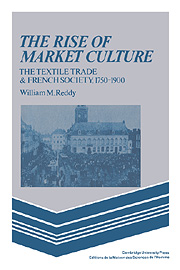Part One - A world without entrepreneurs, 1750–1815
Published online by Cambridge University Press: 30 September 2009
Summary
Money is not a mere “voucher for unspecified utilities,” which could be altered at will without any fundamental effect on the character of the price system as a struggle of man against man. “Money” is, rather, primarily a weapon in this struggle and prices are expressions of the struggle; they are instruments of calculation only as estimated quantifications of relative chances in this struggle of interests.
Max Weber, Economy and Society, I, 108The idea of a market system implies the idea of an active entrepreneur who, besides buying all the factors of production in competitive markets, also controls their combination in such a way as to minimize costs and maximize profits. Because he must sell his products within a competitive market, in which price is set by the free play of supply and demand, the only way open to him for maximizing profits is through control of costs. This he can achieve only through tirelessly studying the production process and actively directing those changes in it that he deems necessary for reducing costs.
The idea of a market system, therefore, also implies a particular kind of relationship between the entrepreneur and the laborer he hires. Both parties must understand that he has complete control over the exact shape that labor will take within the production process. Otherwise, he will not be able to alter the process at will, which is a precondition for minimizing costs. In the end, labor must be understood as being delivered to him like a raw material, in a shapeless, unrealized form, malleable, abstract.
- Type
- Chapter
- Information
- The Rise of Market CultureThe Textile Trade and French Society, 1750–1900, pp. 19 - 21Publisher: Cambridge University PressPrint publication year: 1984



